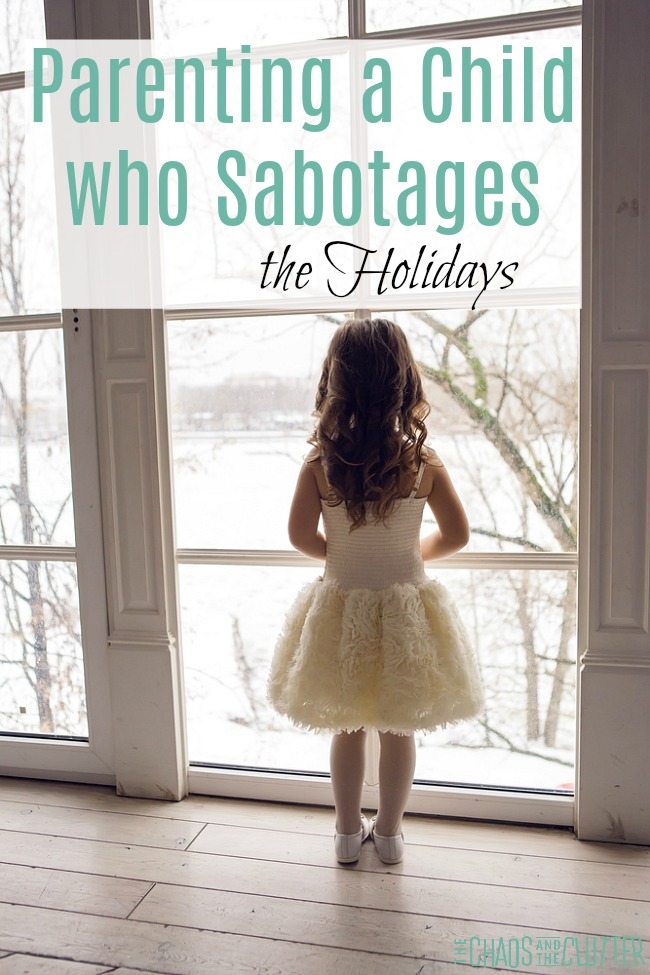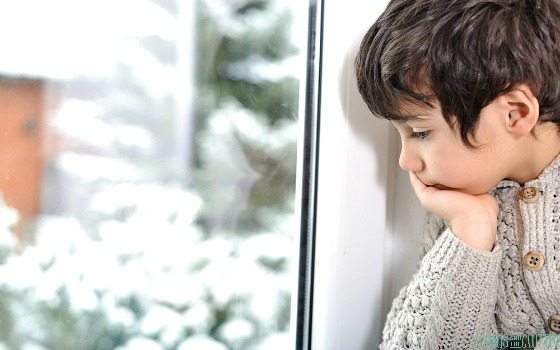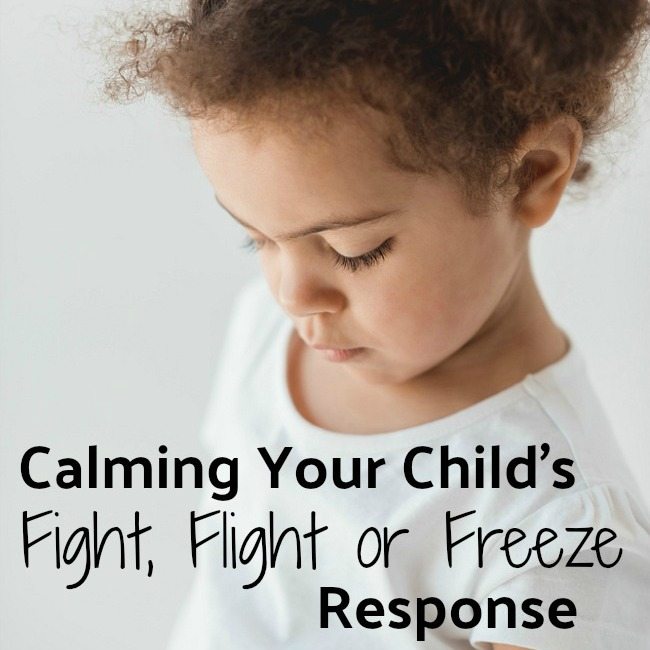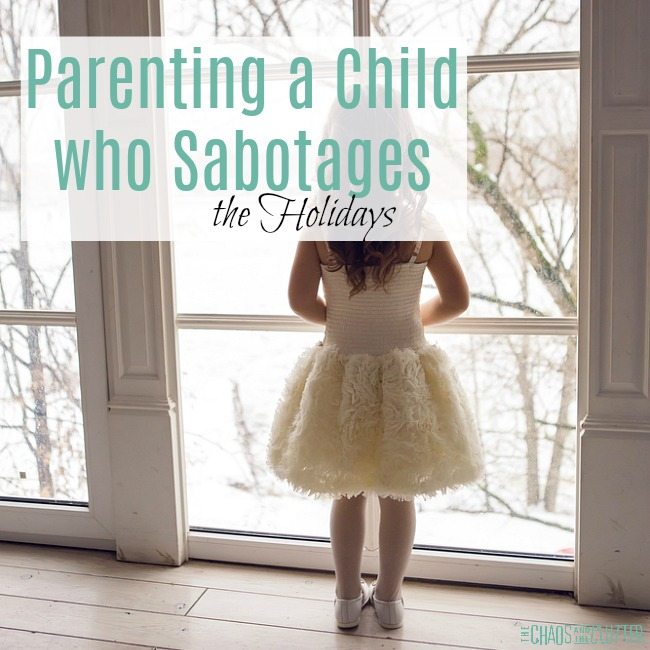The holidays are a special part of the year that most people look forward to, but for some families, the thought brings fear or even dread. For children who have Reactive Attachment Disorder or have experienced early childhood trauma or for children with ADHD or sensory processing issues, the holidays can be hard. In fact, sometimes children who fall into those categories will sabotage the holidays.
It is not much fun walking around on eggshells knowing that your child is on a hair trigger and may be set off at any second. But holidays are not much fun for those kids either. Big days can be a reminder of all that they have lost or of how their brain works differently than other people’s do or of how far their behaviour is from what they want it to be.
 Some of our kids have at times sabotaged big days including birthdays (other people’s and even their own), Thanksgiving, Easter, Christmas, graduations, anniversaries, family celebrations, vacations, times of accomplishment when others are the center of attention, Father’s Day, and often in particular, Mother’s Day. The root of the sabotaging behaviours is often guilt and shame, but there can be other causes as well. It’s not just adopted kids who sabotage the holidays. There are many reasons a child may do this.
Some of our kids have at times sabotaged big days including birthdays (other people’s and even their own), Thanksgiving, Easter, Christmas, graduations, anniversaries, family celebrations, vacations, times of accomplishment when others are the center of attention, Father’s Day, and often in particular, Mother’s Day. The root of the sabotaging behaviours is often guilt and shame, but there can be other causes as well. It’s not just adopted kids who sabotage the holidays. There are many reasons a child may do this.
Possible motivations for kids to sabotage the holidays:
- Feeling unworthy. Abandonment or the perception of abandonment in children who have been adopted or who have had one parent leave the family can lead to a deep sense of shame. This may make them feel as if they are unworthy of love, unworthy of having good things happen to them, unworthy of gifts or attention. With that entrenched feeling of being unworthy of truly feeling happy, sabotaging behaviours can begin to emerge. They may sabotage so that they can force what they see as inevitable disappointment. If their parent then responds in anger to their sabotaging behaviour, it only further validates their belief that they are unlovable.
- Triggers. During the holidays, triggers are everywhere. Smells, sights, sounds, memories of the past… the holidays can be a minefield to navigate. These triggers can cause a fight, flight or freeze response.
- Excitement and anxiety feel the same in the body. Read that sentence again. It’s a biggie! Butterflies in the stomach, quickening of breathing rate, a loudly thumping heart, sweating, and trouble sleeping are the same body responses whether you are feeling excited or nervous. When your child feels those body sensations, it can bring memories of times of stress when they felt that way due to anxiety.
- Lack of routine during the holidays can make certain children feel a lack of control. They may then attempt to assert control and take charge. The unpredictability and uncertainty can feel unsafe to them. With less of a set schedule, they may also be overtired and be eating poorly which can also affect behaviour and mood.
- The holidays often come with sensory overload. This can lead to sensory meltdowns which unintentionally sabotages the holidays
- The weight of expectations. When a child believes that he will fall short of the expectations placed on him, he may decide to just quickly blow things up to get it over with. The stress that come with anticipating the disappointment they may cause can be overwhelming.
- For children with Reactive Attachment Disorder, Christmas can be a nightmare because during the holiday season, relationships are usually the focus and there is more emphasis put on family togetherness and unity. This feels like a threat to kids who are putting protective walls up when it comes to family relationships.
- Unreasonable expectations. Even the most neurotypical, well grounded children tend to have high expectations during the holidays. This is sometimes magnified in kids who have a trauma history or have sensory needs. Some adopted children have a fantasy of what life would be like with their biological parents and nothing in reality can live up to that fantasy.
- Grief. Oh my. Consider a simple tradition such as decorating the Christmas tree. Our family’s collection of ornaments includes those Baby’s First Christmas ornaments and handprint ones I made when many of our kids were newborns. How must that feel for our kids who joined our family when they were 4 and 7? I can buy them ornaments to represent their first years and their milestones, but I cannot replace the hardships of their early years. Holidays have so many things that can magnify grief, sadness and loss.
- Protection. Attempting to protect their heart from further disappointment, a child who has experienced early trauma will put walls up and push others away. With everything being magnified during the holidays, those walls have a tendency to go higher and that pushing away can turn to an aggressive shove (literally or figuratively).

Parenting kids who sabotage the holidays:
- Lower your own expectations.
- Provide a lot of opportunity for sensory input.
- Create a calm down kit for your child. We have a specific Christmas Calm Down Kit as well.
- Maintain routines as much as possible.
- Talk candidly with your child ahead of time. Speak factually about past holidays and their challenges with them. Brainstorm strategies with them to help this year go more smoothly.
- Less presents! When it comes to kids who struggle with the holidays, less is more.
- Simplify. Practise saying “no” to some of the invitations so that you do not over schedule.
- Be willing to let go of things that don’t work for your child. You may need to set aside even treasured holiday traditions for a few years.
- Some kids do not do well with surprises. Even though you may think that surprises are fun, they may cause additional stress for your child. If your child falls into this category, resist the urge to surprise them.
- Prepare your child ahead of time what to expect. Tell them where you are going, who will be there, how long you will be staying, what you will be doing there, and what your expectations are of them. Use a calendar to give them as much notice as you can of upcoming events.
- Make a plan with them for where they can go at an event if it becomes too much for them or a signal they can give you that they have reached their limit.
- Talk with your family members and close friends ahead of time and explain why the holidays can be rough for your child and what they can do to minimize the difficulty.
- Manage their expectations. If your child has asked for a gift that is out of budget or not something you want them to have, tell them ahead of time that they won’t be receiving it. Speak about how not everything during the holidays go as planned or as wished for. Come up with strategies for managing disappointment.
- Include therapeutic and/or sensory breaks on the big day. Whether it be a birthday, Thanksgiving or Christmas, be willing to pause everything to practise some calm-down techniques.
- Accept that there will be meltdowns (or tantrums or rages), but follow these steps to keep their frequency and intensity as low as possible.
- Talk to your child about which family traditions are hard for them and ways you can make them easier. Gift exchanges are hard for some kids. I let one of my daughters wrap her gifts with me. She then knows what she will be getting, but it takes the anxiety out of it for her and makes Christmas day run more smoothly for everyone.
- Make small promises and then follow through on them in order to maintain trust.
- Talk ahead of time to your child about how excitement and anxiety feel the same in the body and then in the moment, help them distinguish which they are feeling.
- Never equate gifts with behaviour. For children who have experienced trauma, the whole “naughty or nice list” is a disastrous concept. Do not take away or threaten to take away gifts or threaten that “Santa won’t come if…” with children who are trying to just hold it together each day.
- Remember: “They aren’t giving you a hard time. They are having a hard time.”
The good news:
When parenting a child with attachment issues or early childhood trauma, it is important for them to hear “yes”. This does not mean buying them everything on their wish list. In fact, that would not be healthy for them, but the holidays do give you more opportunity to say “yes”.
“Yes, I will sit and do the puzzle with you.”
“Yes, I will be at your Christmas concert. I am so proud to be your mom.”
“Yes, you can have a candy cane.”
“Yes, we can drive around and look at Christmas lights. Let’s bring some hot chocolate!”
“Yes, you can help me make the gravy.”
“Yes, you can help me wrap presents.”
“Yes, you can help me plan the dinner.”
“Yes, you can hang some ornaments.”
“Yes, we can decorate cookies.”
To get your free printable sheet of ideas to say “yes” and connect with your child over the holidays, click this link or fill out the form below.
The holidays also allow opportunities for activities to increase eye contact and to promote family togetherness.
No matter how much you prepare and plan, the holidays can still be challenging. To all the parents steeling themselves for the sabotage, grieving the holiday you wish you could have, I see you. You are not alone.
Christmas Calm Down Kit for Kids
Calming a Child’s Fight, Flight or Freeze Response
